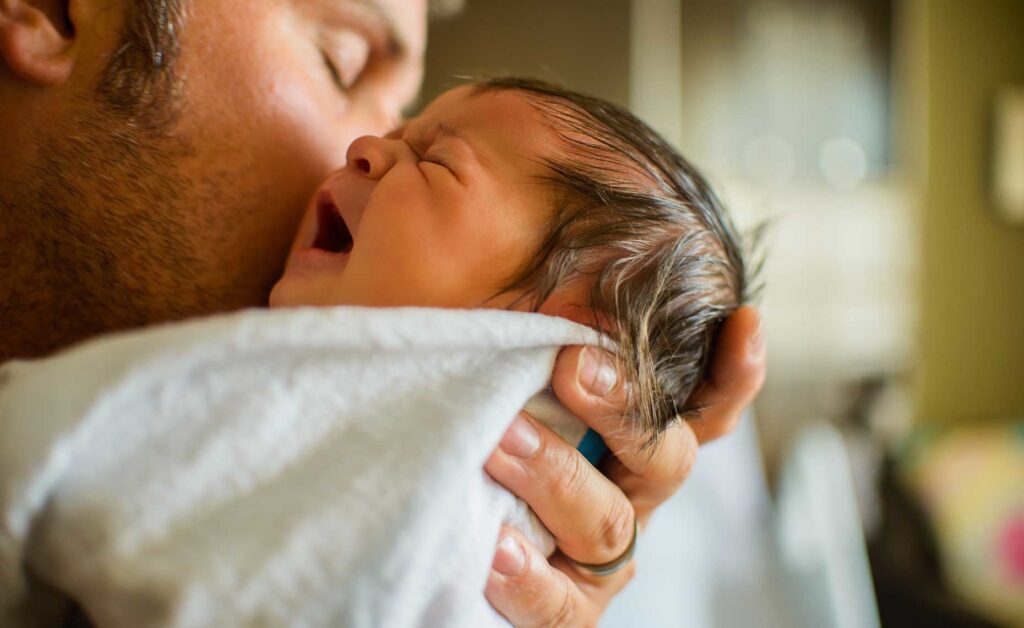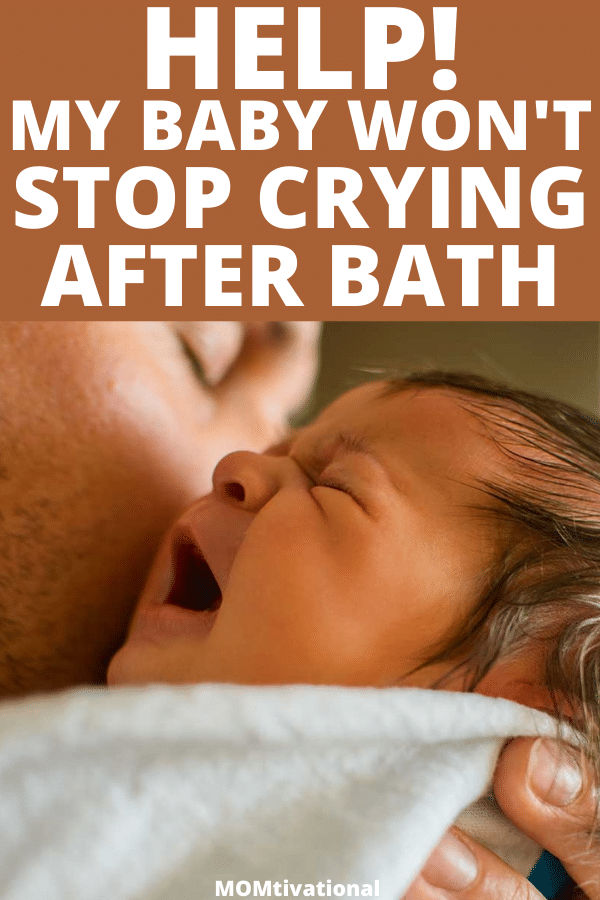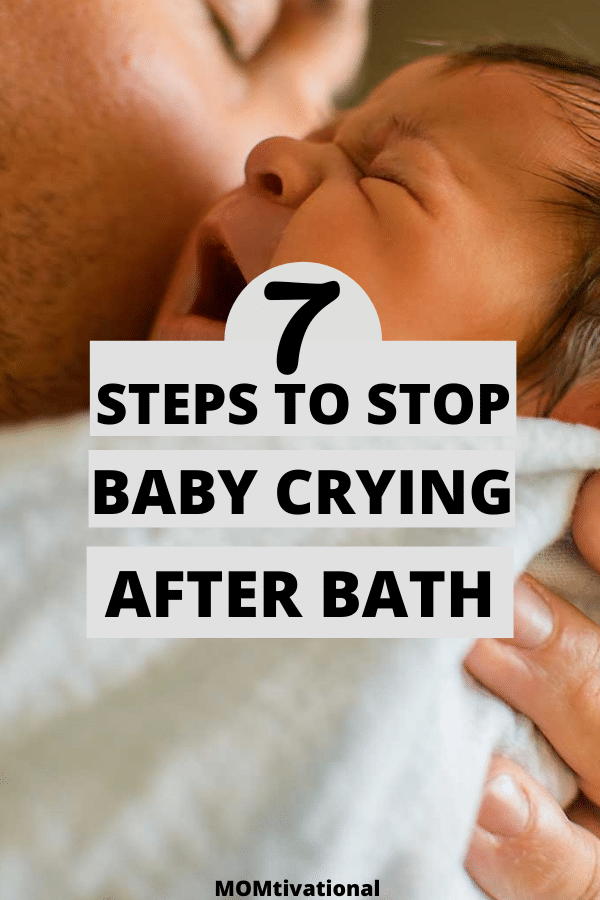Bath time has to be one of my babies absolute favorite things. However, when it comes to an end, my baby always starts screaming and crying. I didn’t understand why babies cry after a bath but it’s actually very common.
Babies cry after a bath because they simply love it and don’t want to get out. A warm bath reminds the baby of the womb, everything from the warm water to the soothing voice. When you take them out of their ‘happy place’ it’s likely they will throw a tantrum.
Do not stress too much – this is normal. Many babies are perfectly content in the bath, only to become very upset when taken out, and scream for what might feel like ages on end.
If this happens to you, you aren’t destined to deal with meltdowns every time you give your baby a bath.
Another reason for the tantrum is that it is simply cold. The bath would be the perfect temperature for them, and when taken out of the bath, the cold air hits their skin and it really just feels uncomfortable.
The key is to ensure that they exit the bath into a comfortable, warm environment, to lessen the change of temperature for them.
Here we dive deeper to learn how we can calm your baby post-bath, to ensure it is a smooth, comforting experience for them
Do Babies Need A Bath Every Day?
You don’t have to bathe your baby everyday. It might seem unnatural, but daily baths can actually dry out your babies skin.
AAP recommends giving your baby a bath just three times a week until their first birthday. Of course, as your baby becomes more mobile they may find themselves in situations where an extra bath is necessary.
How Do I Prevent A Baby Meltdown After Bath?

1. Warm The Room
The main reason your baby cries after a bath is simply that they do not want to get out! You know how it feels, a warm bath can be so comfortable and soothing, and when you get out the cold air hits you like a freight train.
The best way to make it comfortable for your baby after their bath is to make the room warm enough for them so that the transition from the bath to the room isn’t too much of a temperature shock.
Switch the heating on in the room to make sure it is at a comfortable temperature. If you do not have heating, you could look to purchase a small heater to use. A small heater placed next to the bed should be more than enough to warm the area for your baby after their bath.
2. Warm Their Clothes
Not only will the room be cold, but their clothes might be cold as well. You can warm up their clothes in the tumble dryer before they get out of the bath. You can place the clothes and their towel into the dryer so when they get out, they can be wrapped in a warm towel and dressed in some warm clothes.
The warm towel and clothes will help the transition be easier and there won’t be too drastic of a change of temperature, and if you are lucky enough, they might not even feel the cold at all!
3. Snuggle After Bath
Your attitude after your baby’s bath will have a determining factor on how they act as well. Once you have got them out of the bath and wrapped them in a warm towel, snuggle up close to them and sing some songs.
Depending on their mood, and their age, you could sing songs or play games to soothe them and make them happy. If you are positive and calming from the moment you take them out of the bath, they are more likely to be calmer as well.
Your baby will love some snuggles, songs, and games when they are on the bed getting dressed after their bath, and it might distract them enough to stop them from crying.
4. Change Your Bath Products
As a parent, you need to follow your baby’s cues. Their cries might mean a little more than just not liking the temperature change.
The products you are using on your baby’s skin might not be right, and it could be causing some irritation. This could cause them to be uncomfortable after their bath, and sometimes you might not be able to see any signs of this.
If your baby does not stop crying after you warm the room and warm their towels and clothes, look at the products you use during their bath. Switch to a gentler product and see if this makes any difference.
5. Have An Earlier Bath Time
Your baby might be becoming upset after their bath because they are simply too tired. If you bathe your baby in the evenings before putting them to bed, you might want to try and bath them in the afternoon or around an hour earlier.
They could be too tired when you put them in the bath, and while the warm water might soothe them, their tiredness could cause them to scream and cry once removed from the bath.
By bathing them earlier in the day, they will be more awake, and you will also be able to play with them more after their bath to keep them happy.
Perhaps add a nice bath to your babies morning routine instead of putting it off for before bed.
Take cues from your baby, if they seem too tired, rather don’t bathe them. It could be too much for them in their state and this could lead to screaming and crying!
Remember, a baby only needs a bath three times a week. Skipping a nightly bath is also a great option if they took one the previous day.
6. Bathe With Your Baby
One of my personal favorite solutions and a great time-saver!
To make your baby feel more comfortable during and after their bath, you could get into the bath with them. They will be soothed by your presence, and you can keep them in your arms when you get out of the bath as well.
You will be able to have some wonderful skin to skin contact in the bath, which is just so great for your baby’s development overall and helps you to bond further.
To soothe your baby in the bath, you could breastfeed or bottle-feed them while bathing. This could offer that extra little bit of comfort that they need to keep them settled after bath time.
7. Soothing Your Baby
Being in the bath, your baby is reminded of the womb, the most comfortable place they know. You then take them out of the bath and they lose that comfort, it is no wonder many of them cry.
It can be so stressful to have your baby suddenly start screaming and crying after a bath. As difficult as it can be, try to remain calm.
For the next bath time, warm the room, warm their clothes, and try to sing and calm them once they are out of the bath. They will get used to their bath time soon enough!
Your baby might absolutely love bath time, relaxing in the warm water, and bonding with you as you gently soothe and wash them. When bath time is over and it is time to get dressed, you might find your baby screaming and becoming incredibly unhappy but it doesn’t have to be this way.
With these actionable steps, you can help prevent your baby from crying and screaming after a bath every time.
Don’t forget to like, pin, and share me!

